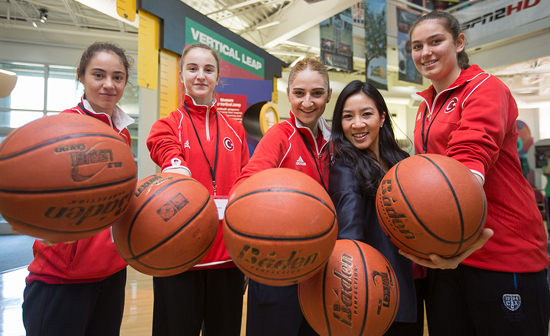What does the U.S. Department of State, the government agency devoted to international affairs, have to do with sports? Why would a U.S. federal department working with foreign governments try to get in on the sports game?
Because sports connect people from around the world—women, men, girls, boys, young, and old—on a grassroots and face-to-face level. In the international arena, sports are a universal force that can motivate, captivate, and unite us regardless of our backgrounds.
It is in this light that the State Department’s Sports Diplomacy Division taps into the power of people-to-people sports exchange programs to build bridges between nations. No translation necessary. When you sweat it out together, you can understand one another better. On this common ground, we can work together to address both local and global challenges.
Among these challenges, gender inequality emerges as one of urgency and utmost significance. While the uphill battles facing women and girls vary in degree between countries, communities, and even families, the gaps are prevalent.
Building on a long-term commitment to gender-balanced exchange programming, the State Department officially launched the Empowering Women and Girls through Sports Initiative in 2012. Through this initiative, the State Department shares a distinct mission with the Women’s Sports Foundation (WSF): the goal to empower women and girls through sports here and abroad. Like the WSF, the State Department believes sports are a vehicle to improve the status, liberty, and well-being of women, girls, and marginalized people at home and abroad. In effect, the WSF and State Department are partners with shared hurdles, objectives, and victories to create sports opportunities for women and girls.
To this day, women and girls around the world lack opportunities to go to school, enter the workforce, or participate fully in the political process. Similar inequality exists in the sports sphere as well. In some countries, it is not culturally acceptable for a woman to join a sports team or even jog outside. And sometimes it is not safe for youth or women to participate in sports, But it’s important to continue to break down barriers; women and girls’ participation in sports can challenge gender stereotypes and discriminatory attitudes. And sports can be basic – no special spandex or hi-tech equipment is necessary for a good game of street soccer or a foot race. Even in difficult economic situations, girls can experience sports if their involvement is embraced—or even better, celebrated—by society. Through sports, they learn about peaceful competition, hard work, leadership, and teamwork – all attributes that equip women and girls to help create stronger, more productive, and stable communities, from St. Petersburg, Florida to St. Petersburg, Russia.
Secretary of State John Kerry has underscored this reality by saying, “No country can get ahead if it leaves half of its people behind. That’s why the United States believes gender equality is critical to our shared goals of prosperity, stability, and peace.”
The WSF’s innovative sports programs, critical research, and network of frontierswomen in American sports help fuel the State Department’s global sports diplomacy efforts. Through the Empowering Women and Girls through Sports Initiative, the Department aims to spread the lessons of Title IX—equality and opportunity for women—to the world-at-large. By working with U.S. embassies in more than 100 countries on inbound and outbound sports exchange programs, the State Department expands the footprint of Title IX and supports the WSF’s endeavors in every corner of the world, allowing new generations of girls to experience the many benefits that come from participating in sports: increased confidence, improved health, and enhanced academic success. As WSF’s research validates, these values are important not only on the court and the field, but also in the classroom, boardroom, or city hall.
Under the Empowering Women and Girls through Sports Initiative, the State Department has teamed up with the University of Tennessee’s Center for Sport, Peace, and Society to spearhead a series of sports exchanges involving women, girls, and male coaches who are key parts of the equation to open opportunities to women in sports. From the first disability sports organization for women in Mongolia to new mandatory health and wellness school sessions for girls in the Caribbean, the international exchange program participants put ideas into concrete action back home. From the Philippines to Pakistan, our all-star exchange alumni are helping post-natural disaster communities recover through sports or introducing girls soccer teams to neighborhood families. They are learning from and building on the successes that Americans have had in women’s sports and joining us to tackle the myriad challenges that still exist. And while the United States offers our lessons and resources to the international community, we also learn from the rest of the world as we move forward.
From Tbilisi, Georgia to Atlanta, Georgia, girls share common interests and common goals. They want to move. They want to learn by experiencing sports on the field, court, or pool, regardless of talent, or physical or intellectual ability. Through physical demonstration in sports, women can heighten their presence in communities around the world. In a matter of minutes, a kick on the soccer pitch, three-pointer on the court, or sprint on the track can show that a girl is capable and strong. The State Department encourages societies around the world to embrace equal rights for women—and sports can be an integral part of the movement. With women’s sports, local successes can go global and global successes can become local.

